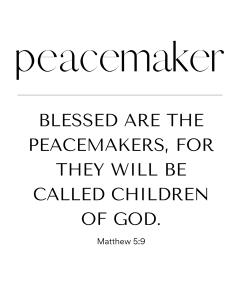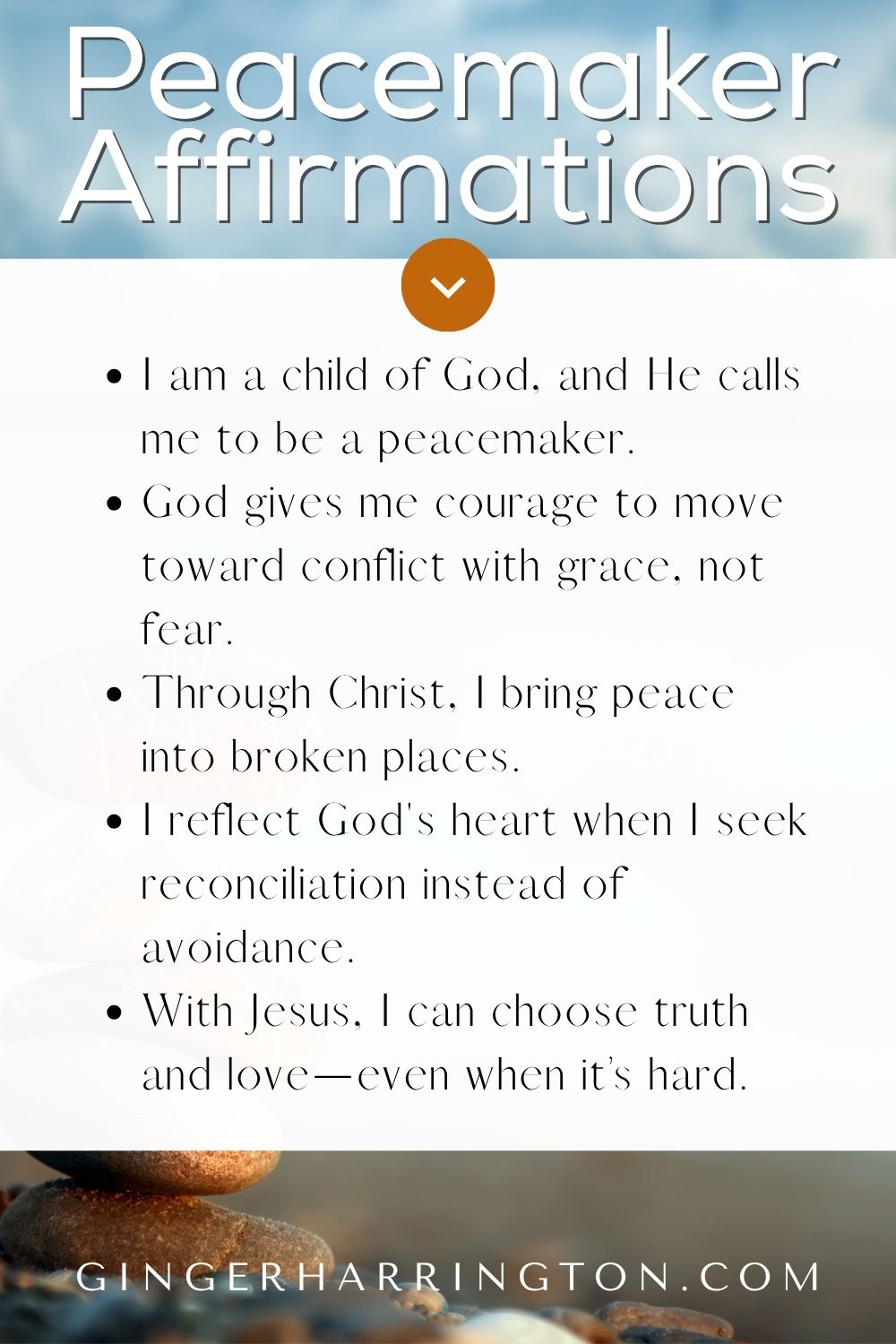Learn the difference between a peacekeeper and a peacemaker, and explore how biblical conflict resolution begins with courage, grace, and spiritual strength.
Do you ever find yourself dodging difficult conversations—not because you don’t care, but because you’re tired of the tension?
Maybe it’s easier to stay silent, to scroll past, to hope things blow over. You tell yourself, “It’s not worth the drama… I’ll just keep the peace.”
But what if real peace isn’t found in keeping quiet—but in courageously stepping into the tension with God’s heart?
Today’s habit helps us do just that—because peacemaking isn’t passive.
It’s a holy, hopeful act of courage—a choice to bring peace where it’s needed most, even when it’s hard.
Let’s explore what it really means to be a peacemaker—and how choosing courage over avoidance can become a holy rhythm of biblical conflict resolution.
Peacemaking Starts with Courage: How to Be a Peacemaker in Real Life
Habit of Peace: Reach out with courage—because peacemaking means stepping toward people with grace, not away from conflict in fear.
Real peace begins with one small act of obedience—especially when comfort would tell us to keep quiet.
Peace doesn’t come from pretending everything’s fine or hoping conflict will fizzle out on its own.
Jesus calls us to be peacemakers—not peace-avoiders. Share on XThat means we don’t wait for others to fix things or for emotions to settle. Instead, we take the first step: offering a kind word, seeking reconciliation, or showing up with gentleness when it would be easier to shut down.
Peace grows when we move toward people with God’s heart—especially when it’s awkward, risky, or uncomfortable.
That’s the steady, brave work of a peacemaker.
Peacemaking begins with one small step of courage in the direction of grace.
What Matthew 5:9 Teaches About Biblical Conflict Resolution
 Let’s look at what Jesus says in Matthew 5:9, one of the most striking promises in Scripture:
Let’s look at what Jesus says in Matthew 5:9, one of the most striking promises in Scripture:
“Blessed are the peacemakers, for they will be called children of God.” — Matthew 5:9 (NIV)
Peace doesn’t grow through avoidance—it grows through action. When Jesus spoke these words, He wasn’t offering a self-help tip or a personality trait to aspire to—He was describing the character of those who belong to His kingdom. So what does it really mean to live like a peacemaker?
This verse gives us one of the clearest pictures of biblical conflict resolution—inviting us to become agents of healing in the face of tension, rather than people who avoid or escalate it.
Matthew 5 is the beginning of the Sermon on the Mount, a sweeping message where Jesus redefines what it looks like to live in alignment with God’s kingdom. The Beatitudes—the opening statements of this sermon—flip worldly values upside down.
In a culture that admired power, status, and self-preservation, Jesus said things like:
- Blessed are the poor in spirit.
- Blessed are those who mourn.
- Blessed are the meek.
- And here: Blessed are the peacemakers.
Each “blessed” is a glimpse into the kind of life that reflects God’s heart—a life marked by mercy, purity, humility… and peace.
The Difference Between a Peacemaker and a Peacekeeper
Let’s unpack peacemaker vs. peacekeeper–honestly, we tend to interchange these two words. But they mean very different things. The word peacemaker refers to more than keeping things calm. It’s the courageous and creative work of making peace where it doesn’t yet exist.
It’s active. Intentional. Relational.
Peacemaking is the creative work of stepping into brokenness with God’s love. Share on XJesus didn’t say “blessed are the peacekeepers.” There’s a difference:
- Peacekeepers often seek to avoid conflict. They may suppress tension for the sake of surface calm.
- Peacemakers, on the other hand, step toward conflict with humility and truth. They’re not afraid to enter hard spaces with gentleness and grace, believing that God can bring healing where there’s been hurt.
This kind of peacemaking takes courage, because it risks rejection or misunderstanding. But it also reflects God’s heart. And it gives us a practical model for biblical conflict resolution that’s both courageous and compassionate—rooted in humility, not control.
When Keeping the Peace Isn’t Enough: A Call to Be a Peacemaker
In modern terms, peacekeeping often brings to mind military or diplomatic missions—designed to hold opposing sides apart, monitor ceasefires, and prevent further violence. These roles are critical, honorable, and often dangerous. But their primary aim is to maintain peace by managing conflict, not necessarily to reconcile it.
Spiritually, we can fall into that same mindset—trying to manage conflict by keeping things calm on the outside. We become emotional peacekeepers: avoiding confrontation, suppressing tension, and hoping everything stays quiet.
But the peace Jesus is talking about runs deeper.
- Peacekeepers try to hold things together.
- Peacemakers restore what’s been broken.
They move toward the source of tension with humility, grace, and truth—trusting that God’s presence can do what human effort alone cannot.
And that’s why Jesus says peacemakers will be called children of God—because they reflect the heart and character of their Father and they carry His peace into places that need it most.
Facing Conflict with Faith: One Step Toward Becoming a Peacemaker
Think for a moment—where in your life is peace missing?
Maybe it’s a conversation you’ve been avoiding. A relationship that feels tense. A silent space that used to be filled with laughter.
Peacemaking doesn’t always mean fixing everything. It starts with a single step—praying for someone who hurt you, softening your tone, or opening a door that’s been closed too long.
That’s the heart of biblical conflict resolution—it’s not about winning, but restoring.
So here’s the reflection for today:
Where is God inviting you to be a peacemaker?
Ask Him to show you one space, one relationship, or one moment this week where you can move toward peace—with courage and compassion.
Whether the tension is big or small, recent or long-standing—Jesus sees it. And He invites us to be part of His peace-making work in the world.
Let’s ask Him for the courage and grace to live this out.
Courage to Make Peace: Scripture Truths to Strengthen Your Heart
When conflict weighs heavy or you feel tempted to avoid hard conversations, it helps to root your mindset in truth. Scripture affirmations are a way to agree with what God says is true—about peace, about courage, and about your identity as His child.
Here are five simple “I believe” statements to anchor your heart in God’s Word as you learn to be a peacemaker:
- I am a child of God, and He calls me to be a peacemaker.
Matthew 5:9 – “Blessed are the peacemakers, for they will be called children of God.” - God gives me courage to move toward conflict with grace, not fear.
2 Timothy 1:7 – “For God gave us a spirit not of fear but of power and love and self-control.” - Through Christ, I bring peace into broken places.
Colossians 3:15 – “Let the peace of Christ rule in your hearts…” - I reflect God’s heart when I seek reconciliation instead of avoidance.
Romans 12:18 – “If it is possible, as far as it depends on you, live at peace with everyone.” - With Jesus, I can choose truth and love—even when it’s hard.
Ephesians 4:15 – “Speaking the truth in love…”
Which of these truths do you need to cling to today as you seek peace in your relationships?
🙏A Prayer for Biblical Conflict Resolution and Peacemaking Courage
No matter where you are in the process—whether you’re facing a hard conversation or simply learning to let go of avoidance—God meets you with grace.
Let’s ask Him to give us the courage to reflect His heart as we step into peace.
Lord, thank You for calling us to more than surface peace. You are the true Peacemaker, and we want to follow Your lead.
Give us courage to move toward others with humility, even when it’s uncomfortable.
Soften our hearts, steady our words, and guide our steps into the places where peace feels far away.
Help us reflect Your heart—creating calm in the chaos and healing where there’s been hurt.
Make us bold in love and faithful in forgiveness.
In Jesus’ name, Amen.
Why Choosing to Be a Peacemaker Reflects Biblical Conflict Resolution
Friend, peacemaking may feel risky—but with Jesus, you never step in alone.
Every time you choose to speak peace into tension, show up with gentleness, or take that first brave step toward reconciliation, you’re walking in the way of Christ.
It’s not about having the perfect words or fixing every situation—it’s about reflecting the heart of your Father. That’s what it means to live like a peacemaker.
And when you do, you’re living out the identity Jesus gave you in Matthew 5:9—a beloved child of God who carries His peace into a broken world.
If today’s message encouraged you, take a moment to share it with someone who might be in a hard or tender season. Sometimes a gentle word is exactly what someone needs to breathe again.
-
Catch the Full Habits of Peace Series
Habits of Peace Episodes
- 40.Need a Little Peace? A Simple Habit to Notice When Peace is Missing
- 41.How to Pursue Peace God’s Way: A Simple Habit to Calm Your Soul
- 42.Peace is a Person: How to Embrace Calm in the Presence of Christ
- 43.How to Find Perfect Peace When You Feel Stressed (Isaiah 26:3)
- 44.One Peaceful Habit to Respond with Grace When You’re Angry
- 45.How to Let Go of Control and Let Peace Rule in Your Heart
- 46.Peacemaker vs Peacekeeper? How Jesus Calls Us to Respond to Conflict
- 47.Why Do I Keep Losing My Peace-Even When I’m Trying to Trust God?
- 48.How to Feed Your Soul and Grow Lasting Peace (Galatians 5:22)
- 49. Live in the Overflow: How to Experience God’s Peace Every Day (Romans 15:13)
Want to Respond with Peace Instead of Pressure? Start by Caring for Your Soul.
Download the Soul Care Made Simple guide for practical ways to reset your rhythms, release emotional overload, and refocus on God’s peace—so you can become a peacemaker from the inside out. Click here for your guide.




 So glad you're here. I help busy women—gals like you— build healthy habits for living well with biblical wisdom and practical steps to deepen your faith, increase your hope, and thrive in your purpose.
So glad you're here. I help busy women—gals like you— build healthy habits for living well with biblical wisdom and practical steps to deepen your faith, increase your hope, and thrive in your purpose.



